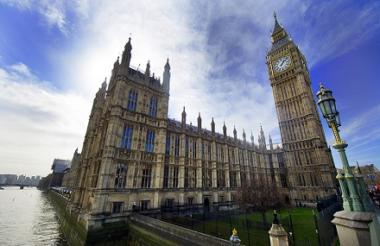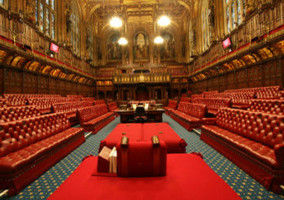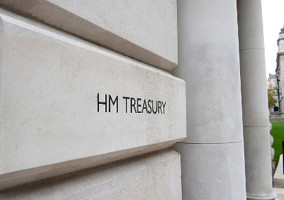The government should consider extra funding to support charities that face being squeezed in the medium and longer term, members of the House of Lords said yesterday.
The Liberal Democrat peer Lord Addington called a virtual debate to discuss how the charity sector would be affected by the ongoing coronavirus pandemic.
Opening the debate, he said: “Virtually all aspects of life have a charitable input into them. Education, care, support, social activity, the arts and sport are all covered and interact with it in certain ways, as do virtually all commercial activities. This is something we must take seriously and pay attention to, not only during the crisis but as we exit it.”
He added: “All charities will be pressurised; they will find themselves curtailed and squeezed at virtually every level. We have to think of better ways of helping and supporting them, to make sure that the functions they have taken on are still there later.”
Addington explained that charities running out of reserves may not be able to resume activities without extra support.
“The organisation and financial structures of charities now will dictate what they can do when this process ends,” he said. “The government must take this seriously and address it in future planning. If they do not, I am afraid that much of the good work may be spoiled, and our society will be much weaker and more vulnerable in the future.”
‘Teetering on a cliff edge’
Several peers expressed concern about the future viability of charities.
The Lord Bishop of St Albans said: “My Lords, at the very time when we need every charity in the country to be mobilised and deployed, many are teetering on a cliff edge.”
He suggested increasing the amount raised by Gift Aid.
“We are all passionate about trying to allow charities to function fully again and to raise their funds; meanwhile, they need help, and they need it rapidly. Has the Treasury considered a simple mechanism based on raising the amount of Gift Aid that charities can claim back? It is an excellent form of match-funding and would be relatively simple to administer.”
Baroness Morgan of Cotes, Conservative peer and former culture secretary, was one of many peers who highlighted the role of small charities.
She said: “We have received a lot of lobbying and briefing from the larger charities ahead of this debate. However, I think we all know that it is the tiny charities that make a real difference at the grassroots in this country, for which not a huge amount of money makes a tremendous difference.”
This means the funding should be easy to access, she added: “There must be a way of making any application process for small charities, and for charities in general, as simple as possible.”
Further squeezed
Morgan also raised the issue of future economic issues, and said the government should be prepared to support charities in the long term.
She said: “The package put in place at the moment is clearly designed to provide immediate crisis funding for our charities, but there are longer-term consequences, particularly for other, non-Covid-related conditions, where funding for medical research is critical. I hope the government will provide funding to enable those important schemes to restart.”
Baroness Wilcox of Newport, Labour, said of charities: “After 10 years of austerity, they had already been cut to the very bone before this situation hit.”
She added: “More support must be leveraged into the charity sector to prevent it being decimated. The Welsh government have implemented measures, but they too need more funding. Can the minister ensure that the UK government also support charities and the voluntary sector with extra funding during these extraordinary times in which we live?”
Baroness Benjamin, Liberal Democrat, said: “What will happen to vulnerable people when the charities they rely on for support cease to exist or are forced to reduce their operations?”
Baroness Hayter of Kentish Town, Labour, emphasised that charities will be needed even after the current crisis: “It is therefore essential that work now starts on a recovery and rebuilding phase, where voluntary organisations will still be needed to play a major role, as there will be continuing demands on their services even as people emerge from the lockdown. We must ensure their resilience now so that they are there when society – and government – needs their strength, continuity and experience.
“That means infrastructure bodies able to speak for the whole sector being created where they are currently missing, to co-ordinate and help to establish local networks.”
Government’s approach ‘fundamentally flawed’
Baroness Barker, Liberal Democrat, said the government's approach so far was not good enough. “The government’s approach to charities at this time is fundamentally flawed.
“Look no further than the statement by a minister in another place, Oliver Dowden, to the DCMS Select Committee the other day – that the government had made a ‘horizontal intervention’, applied to all sectors equally.
“In other words, the government thought up blanket solutions for business and just rolled them out. Those business solutions do not apply to many businesses, and certainly not to many charities and social enterprises.
“Will the government therefore agree as a matter of urgency to meet representatives of the sector who understand charity law and finance, to come up with changes to the existing package to ensure that it works?”
‘Some charities will fail’
Lord Harris of Haringey, Labour peer and chair of the Fundraising Regulator, warned of a “two-way squeeze”.
He said: “These are challenging times for charities. Some charities will fail, possibly including well-known household names. The government assistance package addresses only part of the £4bn shortfall highlighted by the NCVO.
“We do not know when the current health crisis will end, but the economic aftershock will be long-lasting, so the two-way squeeze, in which charities have less money but greater demand on their services, will continue. The problems are not going away anytime soon.”
Lord Low of Dalston, a crossbench peer, raised the issue of advice services being particularly hit.
He said: “Many free advice organisations are facing imminent collapse. The Advice Services Alliance, the umbrella body for advice services and of which I am a patron, says that many advice sector organisations are ‘struggling to keep services going’ when faced with increased costs from remote working while anticipating unprecedented demand.”
Change furlough rules
Lord Wei, Conservative peer, welcomed the measures already announced but said: “We live in extraordinary times and more measures are needed.”
He urged the government to: “relax some of the furlough rules so that more workers generally as well as in charities can start to work a number of days, perhaps on condition that they give up some of their time to help, volunteer and fundraise for their local charities?”
He also called on the government to tax some businesses to provide extra money to charities.
“There is an opportunity for the government to impose windfall taxes on certain industries and businesses that are clearly doing very well out of this crisis,” he said. “Could some of that earned tax be distributed back to charities in the form of an emergency Gift Aid increase, perhaps time-limited, to encourage, on top of all the generosity we have seen so far, more of the public to give at this time of year, certainly before the winter?”
‘Charities must take radical steps themselves’
Lord Leigh of Hurley, Conservative peer, called on charities to reduce their overheads and criticised duplication in the sector.
He said: “It might well be that the £4bn that the NCVO predicts in lost income for the first three months stretches across the year, although personally I am not so sure. However, there will be a substantial drop in revenue. Of course, we would all love the government to do more to help, in addition to the measures already announced, but if this crisis is costing us £40bn per month, I cannot see that much more can or will be done, other than perhaps some soft loans.
“It will be up to the third sector to take radical and difficult steps. These will include merging some charities where there is clear and significant overlap to reduce costs. The duplication in the sector, with each organisation having its own overheads, is not efficient, nor is the constant competition to raise funds against other charities.
“Not only do many charities have to think about merging now, but they also have to look hard at their costs. The mean average salary across the top 100 charities was £265,000 for the top CEOs. Of course, many have taken welcome pay cuts, but the lessons of the NCVO’s 2014 report still have not been learned.
“No one would have wanted this terrible current situation. Sadly, we have no choice but to accept that the sector needs to be streamlined, more efficient and more focused on its main purpose of helping those in real need. I hope that my noble friend the minister will agree to help with the streamlining. I really do wish the sector well over this terrible period.”
Government response
Baroness Barran, minister for civil society, praised the work of the sector, but said no changes would be made to the furlough scheme.
She said: “Charities and volunteering are part of the bedrock of our communities, especially in unprecedented times such as these.”
Barran said she is “in daily contact with civil society organisations large and small”, but that the furlough scheme would not be reviewed. “The purpose of the scheme is to support people who would otherwise have been made redundant.
“In order to prevent fraudulent claims, we have been clear that individuals cannot work or volunteer for their own organisations. This also protects individuals; if we allowed workers to volunteer for their employer, the employer could effectively ask them to work full time while paying them only 80% of their wages.”
Barran said that so far charities stand to receive £125m via the scheme.
She also said charities were being treated favourably by government: “I stress that this package of support is unprecedented in scale and goes beyond the funding that the government have made available to other sectors.
“We will not be able to save every business or every charity, but in response to questions from the noble Lord, Lord Sharkey, and the noble Baroness, Lady Pitkeathley, we will continue to engage proactively with organisations across the voluntary, community and social enterprise sectors, so that we maintain a complete picture of the impact of coronavirus on the organisations and, of course, the people they serve.”
Event oversubscribed
Ahead of the debate, the number of speakers was limited to 50, meaning 17 who had wanted to be involved could not join in.
A House of Lords spokesperson said: “For practical reasons a decision was made to limit the number of speakers to 50 to ensure virtual proceedings could be managed effectively.
“The speakers list is produced in the usual way with each party/group ordering their speakers following the normal pattern or rotating interventions. Non-affiliated peers and bishops are also allocated slots.”
During the debate, Baroness Barker, Lib Dem, said: “This debate, from which several members of the House have been excluded by the government, is inadequate to cover the complexity and the details for the subject, and that is rather unsatisfactory.
“Therefore my first question is to ask when the government will set aside time for a proper debate. It is needed.”
Related articles












